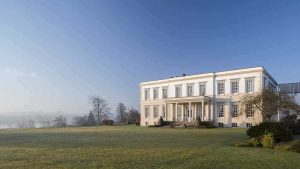Fostering Quantitative Modelling and Experimentation in Developmental Biology
Organisers: Sarah Bray and Richard Carthew
Date: 10 - 13 July 2022
Location: Buxted Park, East Sussex, UK
Although the past 50 years have seen great advances in our knowledge about the mechanisms of growth and development, reductionist approaches to the problem have become limited by the sheer complexity of development. Development and growth are linked to two fundamental and long-standing concepts in biology: 1) an organism’s genotype affects its phenotype; and 2) virtually all organismal processes are adaptive to environment. The linkage is apparent, but how they are linked is still not well understood. The time is ripe to study growth and development as emergent phenomena, and apply quantitative methods towards experiments and modelling. Mathematics is key to enabling this to happen. In-depth examination of the emergent features of growth and development has been slow to evolve because of the paucity of quantitative experimentation that is coupled to mathematical interrogation and modelling.
The primary aim of this Workshop is to bring together world-leading theory and experimental researchers studying organismal growth and development through quantitative approaches. A notable feature is in the diversity of subjects-it is not focused on a particular sub-field of development. Rather, it is unified by the approaches taken to study development. It will provide a forum where intellectual connections can be established among the diverse participants studying a broad spectrum of problems and models, lowering the barriers to interdisciplinary research.
Broadly, the topics of interest will include self-organisation of multicellular systems, tissue-scale mechanics, the complex dynamics of gene expression during development, and the network perspective of gene regulation. The workshop will provide a highly interactive forum, where researchers are invited to present their most recent unpublished work.
Organisers & speakers
Sarah Bray University of Cambridge, UK
Richard Carthew Northwestern University, USA
Alex Aulehla European Molecular Biology Laboratory Heidelberg, Germany
Ruth Baker University of Oxford, UK
James Briscoe The Francis Crick Institute, UK
Francis Corson Ecole Normale Supérieure, Paris, France
Paul François McGill University, Canada
Eileen Furlong European Molecular Biology Laboratory Heidelberg, Germany
Zena Hadjivasiliou The Francis Crick Institute, UK
Ryoichiro Kageyama RIKEN Center for Brain Science, Japan
Mounia Lagha The Institute of Molecular Genetics of Montpellier (IGMM), France
Thomas Lecuit Developmental Biology Institute of Marseille (IBDM), France
Susanne Mandrup University of Southern Denmark, Denmark
Marcos Nahmad Centre for Research and Advanced Studies (CINVESTAV), Mexico
Caren Norden Gulbenkian Science Institute (IGC), Portugal
Alan Rodrigues The Rockefeller University, USA
Tatjana Sauka-Spengler University of Oxford, UK
Eric Siggia The Rockefeller University, USA
Magali Suzanne Center for Integrative Biology Toulouse, France
Elly Tanaka Research Institute of Molecular Pathology, Austria
Early-career researchers
We offer 10 funded places for early-career researchers to attend this Workshop along with the 20 speakers. We just ask that you pay for your own travel costs. If you would like to attend please complete the application form and attach a one page CV and a letter of support from your supervisor. If your supervisor would prefer to send the letter directly to us please ask them to email it to workshops@biologists.com
All attendees are expected to actively contribute to the Workshops by asking questions at presentation sessions and taking part in discussions, as well as giving a short talk on their research.
At some Workshops, early-career researchers are given additional responsibilities to promote their involvement, such as:
- Write a daily blog for the Node
- Summarise the previous day’s themes to set the scene for the next day’s sessions
- Propose future directions and collaborations
- Make a short two minute video on their experience at the Workshop
Most of these activities would be carried out in pairs or small groups and often with the
support of more senior scientists present.
About Buxted Park

The Workshop will be held at the beautiful Buxted Park in East Sussex which dates back to the 12th century. The current house was built in 1722 by Sir Thomas Medley and is an elegant Grade II Palladian mansion set in 312 acres of parkland. Over the years it has played host to a number of high profile visitors including William Wordsworth, Winston Churchill, and George V and Queen Mary. Whilst it was a health hydro in the 1960s Gregory Peck, Dudley Moore and Marlon Brando were regular visitors.
Buxted Park is less than 25 miles from Gatwick Airport and 60 miles from Heathrow Airport. There are direct trains taking 1 hour 10 minutes from London Bridge to the village of Buxted which is only a mile away from the hotel.
Buxted Park Hotel
Station Road
Buxted
East Sussex
TN22 4AY
Tel: +44 (0) 1825 733333
Workshop Photos
Fostering Quantitative Modelling and Experimentation in Developmental Biology
10 – 13 July 2022
Buxted Park, East Sussex, UK








You must be logged in to post a comment.